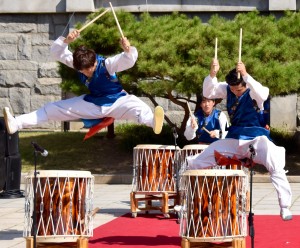Differences Between America and Korea Part 1

There are a number of differences between America and Korea that are important to note when considering teaching in this location.

1. Obedient pedestrians
Koreans really follow the rules here. Coming from someone who partially grew up in New York, a place where pedestrians control the streets, people here are so obedient.
Even if no cars are in sight, they’ll wait till that signal changes before moving a foot. That is of course until they see one person take lead and cross anyway, then herd mentality ensues.
2. Slippers in school
Don’t bother dressing up in church shoes or high heels, especially if you walk to school, because they won’t be seen.
As soon as you get to that school door, shoes come off and get swapped with sandals from the cubby. Everyone adheres to this. Students, teachers, administrators, and yes, the principals too.
3. Mask in public
I can’t say that Koreans are germaphobes (you’ll see why later in the list), but they take precaution of spreading the cold. It’s common to see people in public or students in class with a surgical mask on.
Coincidentally, these are also used to hide fresh operation scars from plastic surgery. But I’ll assume my students just have a sore throat.
4. Cameras in cars
Big brother is always watching…from the comfort of his car seat. There are small cameras affixed to the back of the rear-view mirror in every Korean vehicle.
This is primarily to determine who is at fault in a bumper to bumper accident. Though I’m sure this has also benefitted in the instance of vehicle intrusion or theft.
5. Yes means yes and No means ’X’
It’s interesting how different cultures use different gestures and signals. When being told “no” here, Koreans often cross their 2 index fingers to make an ‘X’.
Maybe this is done more so with foreigners to emphasize the answer, since they’re so scared to speak sometimes.
6. Toilet paper and soap shortage
At your school, it would be wise to bring your own roll of toilet paper because there’s no guarantee there will be any in the stall.
Now where I doubt the whole germaphobe nature is in the frequent occurrence of a lack of soap. It’s so hit or miss, like in Korean restaurants or bars, so keep hand sanitizer with you if this can be a bother.
7. No central air-conditioner
I know central air isn’t everywhere or in every home in the US, but it’s more present than it is in Korea. Here, schools have individual A/C units in each class, and they’ll only start to turn them on when the heat is at a certain high.
In restaurants as well, you may notice a standing A/C unit in a corner providing air throughout. They all work well though, so generally it’s not a huge issue.
8. Skin care
Korea is known for its high-quality skin-care products, likely tied into its obsession with appearance. Koreans even look noticeably different in the face, and you’ll actually notice the skin care products they’re using.
9. Korean glasses
Ok this is a fact; Koreans have their own glasses. I’ve never seen another culture where the type of glasses that are worn stand out so much amongst the people.
Many people wear glasses here, and I feel that 75% of them wear the same ones. They’re big, circular, and thin-framed. If you come to Korea, you’ll see what I mean.
10. Opposite World Map
This was interesting to me when I first saw it, but Koreans (maybe most Asian countries) use an opposite facing map than the West. On their map, the eastern hemisphere is on the left, while on ours it’s on the right. Pretty much both of us (U.S. and Korea) begin the map where our country resides first.
I’ll reveal the next 10 in Part 2 of my 30 Differences between the U.S. and South Korea list!




